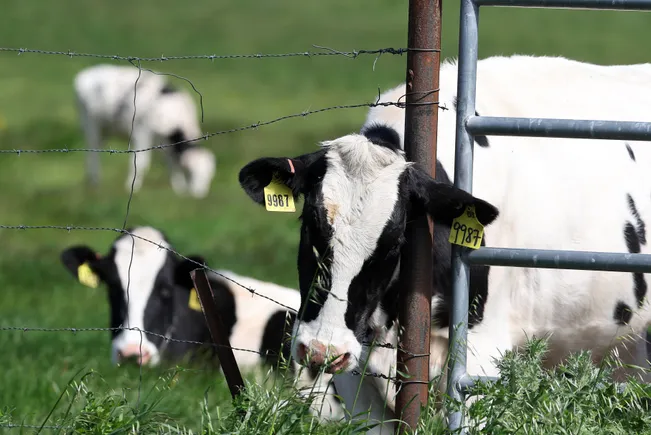Bird flu has spread to the largest milk producing state in the U.S., posing a challenge for government officials who are facing resistance from farmers against expanded testing efforts to control the outbreak.
California, which accounts for one-fifth of the U.S. milk supply, reported cases of the virus at eight dairies within the last two weeks, according to the state’s food and agriculture department. All affected dairies are under quarantine and enhanced biosecurity measures are in place to prevent the spread of the virus. California is the number one producer of milk, butter, and ice cream, and the number two producer of cheese and yogurt in the United States.
Testing revealed the first cases in California had the same variant that cows had in Colorado, suggesting wild birds or poultry flocks were not the cause of infection, said Jacquline Risalvato, an assistant professor of veterinary virology and director of the Virology and Immunology Diagnostic Laboratory at the University of Tennessee, citing a report from the Los Angeles Times. The spread likely came from interstate movement of cattle.
Officials identified the first cases at three Central Valley farms in late August. The department confirmed cases at three additional dairy farms on Sept. 11, with two more added the following day.
Emerging cases are alarming farmers and stakeholders who produce milk and dairy products, which are California’s top agricultural commodities and generate more than $10 billion in annual cash receipts.
“I’d be incredibly concerned if that was my livelihood,” Risalvato told Mekong Farmer. “If I was losing my ability to put money on the table.”
With supply impacts limited, farms are resistant to pay the extra costs that come with testing or worry about exposing themselves to potential repercussions by participating in government bird flu monitoring programs.
So far just 41 cow herds are enrolled in the U.S. Department of Agriculture’s Dairy Herd Status Program, a voluntary effort in which farmers agree to weekly test their animals for bird flu in exchange for eased transportation restrictions. Nearly half of the participating herds are in Michigan; one is located in California.
Since the first infections were identified in March, approximately 203 cases of bird flu in dairy cows have been confirmed across 14 states, according to the USDA as of Sept. 12. While testing is voluntary in some states, Colorado, which has reported 64 infected cow herds during the outbreak, established a mandate in July requiring weekly testing for bird flu on dairy farms.
Experts and government officials have stressed that pasteurized milk and dairy products are safe to consume.
Currently, California has no widespread testing requirement in place. However, cattle displaying flu-like symptoms are not allowed to be moved across state lines, as per the state’s testing protocols. Officials are urging producers to register their animals in state or federal testing and monitoring programs to confirm the health status of their herds.
Risalvato said the genetic sequencing results from the initial farms are a positive sign as there is less risk of the virus circulating among wild birds in the Golden State. Farmers with affected dairy operations are isolating and treating their sick cows, according to California’s food and agriculture department. Officials are tracking animal movement between farms and healthy cows have been cleared to continue shipping milk for pasteurization.
As the most populous state in the nation, the arrival of bird flu in dairy cattle also raises concerns that the virus could more easily spread between animals and humans. While most livestock production in the U.S. occurs in isolated, rural areas, concentrated animal feeding operations tend to be closer to urban areas in California.
So far 14 Americans have tested positive for the virus this year, largely among farm workers exposed to sick or infected animals, according to the Centers for Disease Control and Prevention. The first person to contract the virus without any known exposure to affected animals was reported last week.
The USDA is conducting field tests of bird flu vaccines in dairy cows as a potential solution for the outbreak. While vaccines can be expensive, Risalvato said they are more feasible to use on cattle than poultry and have the potential to prevent bird flu crossover in humans.
In the meantime, producers are urged to start testing herds and take biosecurity measures now to prevent more costly challenges down the line.
“I understand that any testing can be costly to the producer, but without surveillance it’s hard to mitigate any catastrophe,” Risalvato said. “It’s kinda like not doing your annual blood work.”
No human cases of bird flu have been reported in California.



